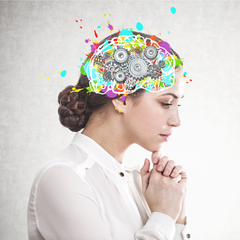Navigating the Interplay of Stress and Pain: Understanding, Managing, and Thriving
Introduction:
The link between stress and pain is one of the most puzzling of the many ways the human body expresses itself. These two events are often inextricably linked for many people, creating a difficult cycle that might affect one's quality of life. Let's embark on a journey to understand this delicate relationship, decoding its nuances and providing insights into managing its effects.
1. The Biological Interplay: How Stress and Pain Communicate

Stress Reaction Mechanism:
The human body's stress response system is a finely tuned mechanism that has evolved over time to help us deal with challenging situations. The fight-or-flight response, which is crucial to human life, is facilitated by these hormones. But it's crucial to know that these stress hormones have an impact on how we experience pain.
When we are stressed, our body places a higher priority on quick and efficient responses to perceived danger. Despite being essential for living, this could lead to increased pain sensitivity. To put it another way, stress can make even minor discomfort seem more severe than it is.
Pain Sensitivity:
The condition called sensitization of the nervous system can result from ongoing stress. This indicates that as time passes, the nervous system's sensitivity to pain signals increases, ultimately making pain feel worse. While stress doesn't necessarily cause pain, it can amplify and prolong the sensation.
Read More: The interaction between stress and chronic pain through the lens of threat learning
2. The Vicious Cycle: When Stress Fuels Pain and Vice Versa

Elevated Stress = Enhanced Pain:
A person may become more sensitive to pain when under long-term or intense stress. People could become more sensitive to pain as a result, making the suffering seem worse than it actually is. Furthermore, some brain areas that process stress and those that perceive pain share neural connections. These areas can increase the sensation of pain when they are both active at the same time.
Stress Increases as a Result of Chronic Pain:
Having chronic pain can be emotionally and physically taxing. Having to deal with ongoing pain can make you more stressed. This tension is exacerbated by the frustration, worry, and agony linked to chronic pain. Unfortunately, this increased stress may also make the pain worse, starting a vicious cycle.
Read More: A vicious cycle: Mental disorders cause the very stress that fuels them
- Psychological Dimensions: The Power of the Mind
Depression and anxiety:
Chronic stress can occasionally make conditions like anxiety and depression worse if it is not treated. These mental health issues may affect our emotional wellbeing in addition to making some people more sensitive to pain. The mental and physical components of pain management must be addressed since they might make it more difficult for someone to deal with pain.
Perception and Expectation: Our emotional state has a big impact on how we experience pain. Increased anxiety can result from anticipating pain or expecting it to be severe, both of which may make it seem worse. This emphasizes how crucial it is to control our mental state in order to reduce our total pain. Techniques that encourage calm and optimistic thinking can be beneficial.
Read More: psychological dimensions scaffold neural action prediction
- Breaking the Chain: Strategies to Manage Stress-Induced Pain

There are gentle and successful ways to treat stress-induced discomfort, even if it may not be feasible to totally prevent either:
Mind-Body Techniques
Deep breathing exercises, yoga, and other mind-body techniques are renowned for their capacity to lower stress levels. These methods promote calmness and mindfulness, which can gradually lessen sensitivity to pain. People who experience pain from stress may find relief by incorporating these practices into their everyday routines.
Physical Activities:
Exercise regularly is recognized to have a variety of advantages for both physical and mental health. The body's natural painkillers, endorphins, might be released while you exercise. This not only assists in lowering stress levels but also improves general well-being. Walking, dancing, or gardening are all enjoyable hobbies that might help you manage pain brought on by stress.
Behavioral Cognitive Therapy (CBT):
Cognitive behavioral therapy is a treatment strategy that gives people useful tools to reframe unfavorable cognitive patterns associated with discomfort and stress. It offers a comprehensive viewpoint on how to handle these connected problems. People can learn improved coping mechanisms for both the psychological and physical components of pain with CBT.
Seeking Professional Assistance:
It's important to keep in mind that different therapies for stress-related discomfort have varied effects on different people. It is essential that you get professional help if you are uncomfortable or showing signs of stress. Healthcare professionals can give individualized interventions and solutions to meet your unique needs. They can offer direction and support, as well as perhaps suggest drugs or other therapies that could help break the cycle of agony brought on by stress.
Read More: Take Steps to Break the Chain of Stress, Pain
Conclusion:Stress and pain share a complex relationship, deeply intertwined in the human experience. Their mutual influence can exacerbate our perception of each, with both biological and psychological factors playing a part. Yet, through various approaches such as mind-body practices, physical activity, and cognitive interventions, we can gently address and manage their impacts. Embracing these insights allows us to approach the interplay of stress and pain with understanding, offering a pathway to better navigate life's challenges with compassion and awareness.

